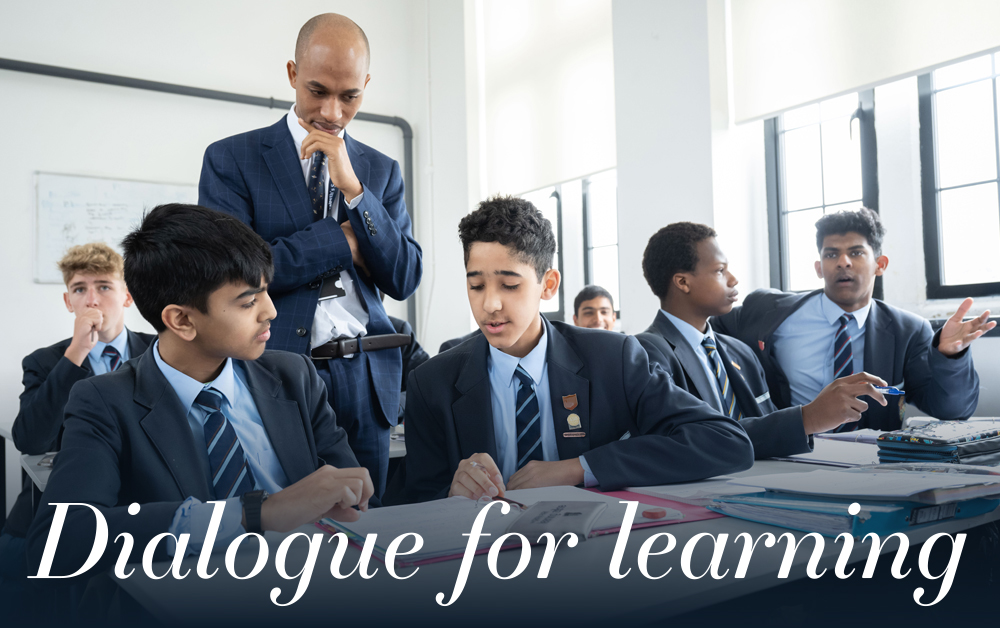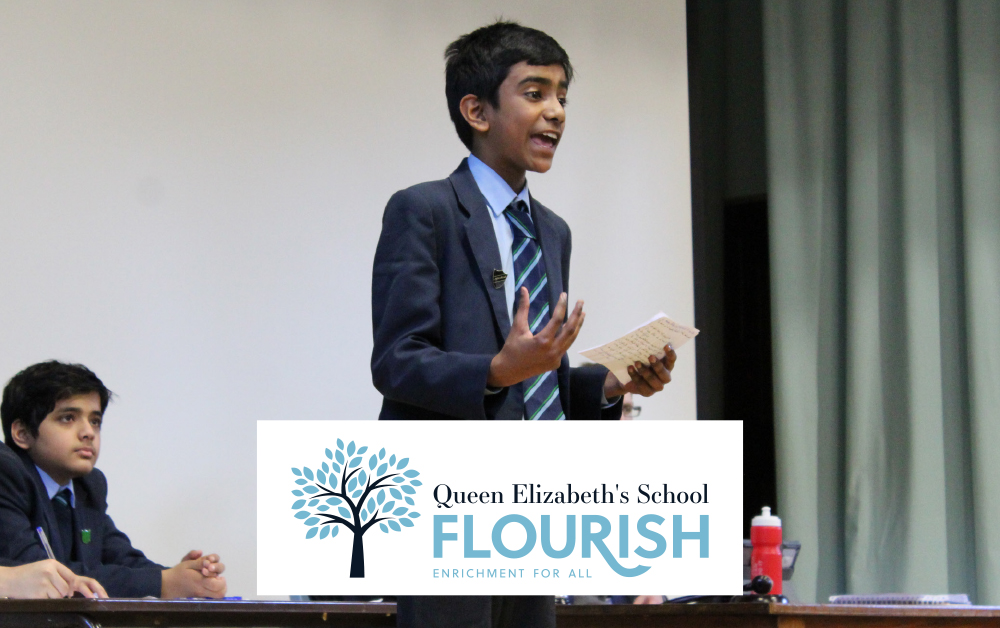|
 |
|
 |

|
|
Dear parents,
Education at QE does not stand still. We are always seeking to enhance our practice and deliver additional opportunities for the boys. One current area of focus is on speaking and listening skills, including the encouragement of effective classroom dialogue. We recognise the importance of speaking and listening in underpinning higher-level thinking, supporting high-quality written work, and building the communication skills that are key for career success. We also affirm the centrality of oracy (the ability to express yourself clearly and effectively), alongside literacy and numeracy, as the foundation of a good education.
This QE Update explains some of the educational rationale behind these emphases, while also giving a snapshot of the relevant work going on throughout the School. To support all this, we are launching a new guide to etiquette in lessons, which is going on display in classrooms. Please take note of the messages on the poster (shown below) and encourage your son to model them. Thank you!

Neil Enright
Headmaster
|

|
|
Encouraging dialogue to promote learning
In line with the priorities outlined in our School plan, Building on Distinction, QE has adopted a disciplinary-literacy approach – recognising that literacy skills and approaches are subject-specific – as part of our strategic development planning. In 2022–2023, we began focusing this approach on spoken language, on listening skills and on structured conversation. This was not, of course, a haphazard process: all such developments at QE are underpinned by evidence; carefully planned; and implemented and measured in a consistent, structured way. Research and staff training was undertaken, learning directly from leading academics and educationalists in this area, such as those at Oracy Cambridge, based at the University of Cambridge.
Departments then considered in detail how they could implement what they were learning. A programme of dialogue-focused learning walks – where teachers observe and learn from their colleagues by visiting lessons – is helping staff consolidate the outcomes of the training and consider their next steps. These learning walks began in the Summer Term, continuing this term and into the spring.
It is now time to raise the profile of this work amongst students and parents, so that our classroom culture encourages dialogue and discussion that promotes learning.
Pupils should be able to:
• Speak clearly to their audience, using concise and precise language;
• Listen by focusing quietly on, and actively reflecting on, what is being said;
• Think about what other people are saying by analysing and evaluating their ideas;
• Engage by asking questions, sharing ideas, and reacting to the contributions of others;
• Respect others by recognising the value of collaborative learning, and by working together through mistakes, misconceptions, and differences of opinion.
Our new classroom etiquette statement, summarised on a classroom poster, will be used to reinforce our high expectations and to shape teachers’ guidance to the boys.
In addition to the work going on with dialogic learning across the academic subjects, we also recognise the importance of promoting speaking and listening skills beyond the classroom. Our next building project, The Robert Dudley Studio, will create a facility dedicated to the spoken word and drama. Construction work will now start in spring 2024. The studio is part of a wider plan to promote, develop and celebrate oracy through our QE Flourish extra-curricular programme, building on successes such as our TEDx conferences, the revitalisation of the Elizabethan Union, the consistent strength of LAMDA public speaking here, and our competitive debating teams. This is also about boys’ futures beyond QE: as James Kane sets out below, communication skills are a sine qua non for almost every career. Few would disagree that to be really successful as a doctor, for example, you need to communicate with high degrees of both accuracy and empathy!

|
Anne Macdonald
Deputy Head (Academic)
|
|
|
|
Taking notice: our new poster
Our new poster for display in classrooms gives some key messages about dialogue in lessons. We’re calling it QE’s guide to classroom etiquette. The posters will be a point of constant reference for pupils and teachers, ensuring that the importance of dialogue for learning is neither out of sight, nor out of mind.
|

|

|
|
Across the School
We asked a selection of subject and department heads for examples of dialogic teaching & learning in their subjects. Scroll down to read: the case that Assistant Head James Kane, who leads the QE Futures programme, makes for the importance of a focus on dialogue in boosting students’ career prospects; and Assistant Head Crispin Bonham-Carter’s explanation of out what QE Flourish is doing to promote oracy among the boys.

|
Mathematics
Dialogic learning is important because sometimes you don't know what you don't know until you try to explain it to someone else! Talking helps students identify gaps in their knowledge. It is also important because it helps them understand that Maths isn't all about getting the correct answer, but also the processes used to get there. Sharing strategies helps them see things in another (sometimes more efficient) way. A third benefit is that talking to a partner provides a place to try out new ideas without being judged or having to perform. Maths can be quite intimidating if you are stuck; it is important to feel safe to make mistakes.
Jessica Steer
Head of Mathematics
|
|

|
Philosophy, Religion and Society
A focus on dialogue in PRS supports pupils in thinking more deeply. For example, when studying the relationship between science and religion, students’ initial beliefs are often overly simplistic or fail to recognise grey areas. Through using dialogic teaching, teachers can prompt students to reflect more carefully on their own claims and more closely analyse those of others. We have also provided boys in Years 7–9 with ‘talk moves’ – tools that suggest ways of speaking and questioning. Students can refer to these to ensure they have richer, more thought-provoking discussions with each other.
Jack Robertson
Head of PRS
|
|

|
English
Strong oracy and listening skills are central to the success of the work we do in English. There is a well-proven connection between oracy, cognition, and writing, where spoken language sets the foundation which so much else is built on. By refining our approach to oracy through the development of dialogic approaches, we are able to increase the depth and sophistication of student thinking in our classrooms right from the start of Year 7.
Robbie Hyland
Head of English
|
|

|
Chemistry
To reach the highest level, students must be confident and consistent in their use of key terminology; if they can say it, they will write it! To encourage this, we might ask them to think about a topic and prepare a response, before then calling on selected boys for an answer. Next, we invite those pupils to consider how they could improve, with questions such as “that’s a great start; how could you include a more technical/scientific term?” Students must also be able to evaluate certain chemical processes or reactions and reach a conclusion. To help them, we frequently ask them to discuss both sides of an argument and then form their opinion accordingly. We also use “think, pair, share”, or “think, group, share”, in some lessons, setting rules or a goal, and a timeframe.
Amy Irvine
Head of Chemistry
|
|

|
Physical Education
We use a lot of dialogic practice when pupils are peer-assessing, and often as a method to maximise progress opportunities. Language is really important when feeding back amongst pupils. In our Sport Education module, pupils are given specific roles as part of a collective, or team, where they will have a responsibility that feeds towards an overall goal. The better pupils communicate effectively, the more chance they have of achieving their goal.
Jon Hart
Director of Sport
|
|

|
Art
For our pupils, taking a dialogic approach to discussing their own artwork and the work of other artists has been beneficial in many ways. They are more confident in personalising their undersanding, appreciating that artwork can have different meanings to different people, and sharing insights that might have otherwise been missed. The ability to present and discuss one’s own work is an especially important skill for pupils seeking to pursue a creative pathway, since portfolio presentations are required for many undergraduate courses, and positions in creative industries. The benefits of a dialogic approach are also seen during visits to museum and gallery spaces: pupils are better equipped and more confident when exploring new and unfamiliar work, as they are more secure in their own opinion.
Craig Wheatley
Head of Art
|
|

|
|
QE Futures
Job advertisements for the sort of roles our pupils will be applying for in the future often cite ‘communication skills’ as essential. Yet research from industry and from educationalists suggests that among young people, the six core employability skills – of which communication is frequently listed at the top – are still not at the level being demanded by employers.
QE’s mission to produce young men who are confident, able and responsible encompasses all six core employability skills: being able involves the acquisition of academic and digital skills; those who are responsible evince leadership and collaboration skills; confident young men demonstrate skills of resilience and good communication. A confident Elizabethan who communicates well will build rapport and engage with others through listening, observing, writing, and presenting. We want students to feel confident engaging with others in all aspects of School life, including when discussing complex ideas in the classroom.
Furthermore, as well as being important and rewarding in its own right, the ability to communicate well underpins the five other core skills, helping boys to navigate challenges, problem-solve, be digitally literate, and to lead and work alongside others. That is why better classroom dialogue is so important to future career success. Through its focus on improving dialogic teaching, the School is making great strides in helping your son become more employable.

|
James Kane
Assistant Head (Pupil Destinations)
|
|

|
|
QE Flourish
As part of QE Flourish’s Challenge (one of our 4Cs, along with Care, Compete and Create), boys take part in numerous public-speaking and debating events. Our Elizabethan Union goes from strength to strength: we see up to 100 boys meeting weekly in the Main Hall to debate current events. From this group, teams are drawn to represent the School in local and national debating competitions. The Model United Nations project also attracts large numbers. A recent MUN event saw 60 boys drawn from every form in the School representing different countries. Boys also join other schools' MUN conferences. All students take part in the QE lecture series: recent talks have come from the Ukrainian Deputy Ambassador, business leaders, leading engineers, and politicians, including former Deputy PM Lord Michael Heseltine.

|
Crispin Bonham-Carter
Assistant Head (Pupil Involvement)
|
|
|
Queen Elizabeth's School, Queen's Road, Barnet, Hertfordshire, EN5
4DQ
|
|
| |
|
|
Copyright © November 2023
|
|
|
|
- - - - - - - - - - - - - - - - - - - - - - - - - - - - - - - - -
|